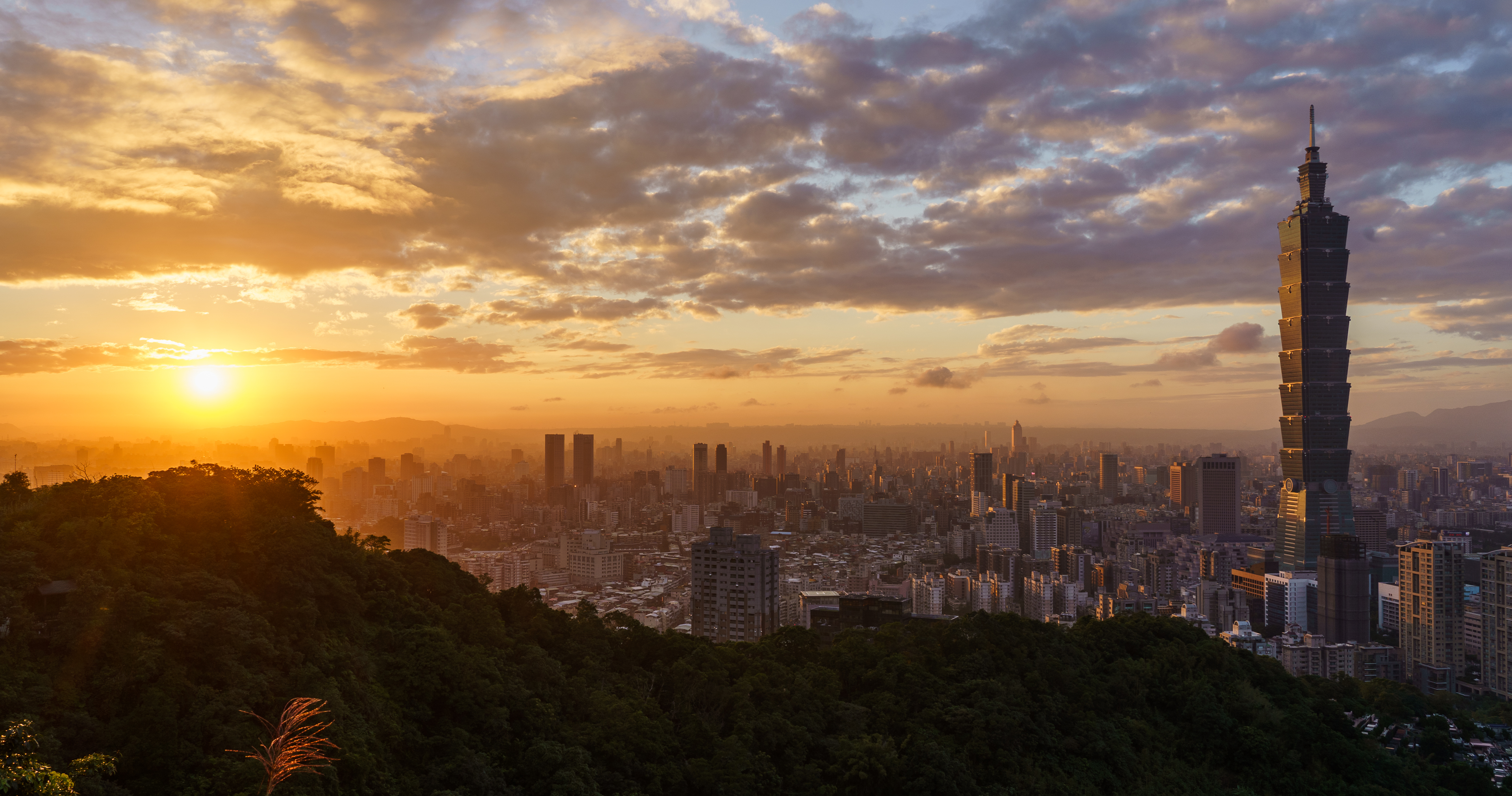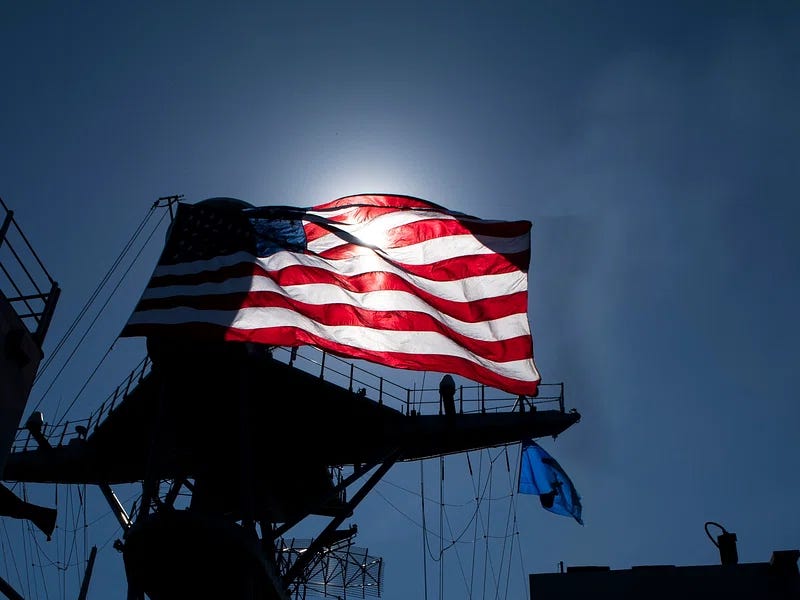Will Washington Face a Reckoning Over Taiwan?
An American president may soon face a moment of truth over Washington’s vague defense commitments to Taiwan as risks grow that Asia’s oldest frozen conflict will thaw.

A few years ago, in an airport ride-share leaving Taipei, I got to chatting with a Taiwanese businessman who recalled meeting Xi Jinping in the early 1990s. Back then, China’s leader was a rising apparatchik in Fujian Province, whose rocky coastline faces the self-ruling island of Taiwan across about a hundred miles of water. Communist China, poor and brimming with cheap labor, envied Taiwan’s export-led prosperity. Beijing zoned selected frontiers, including in Fujian, for market experiments. As party secretary of the provincial capital, Xi warmly welcomed Taiwanese investors. “He seemed friendly when we met him in his office, very modest, very didiao”—low-key—the businessman told me. “He asked detailed questions. He seemed interested in conditions on Taiwan.” The businessman sighed. “Hāi-ah-lah. Oh well. Who could have guessed that, all these years later, as leader of China, he would give a speech on live television threatening to bomb us?”
An American president may soon face a moment of truth over Washington’s vague defense commitments to Taiwan. With each passing year, risks grow that Asia’s oldest frozen conflict will thaw. The island, deemed an “unsinkable aircraft carrier” by Gen. Douglas MacArthur, is a yam-shaped, Bhutan-sized clump of jungle mountains, fringed with mud-flats and cliffs, perched on the Pacific Rim near several U.S. treaty allies. Taiwan’s population of 23 million, approximately the size of Australia’s, clusters into an arable strip of farms and cities facing continental China across the stormy Taiwan Strait. (The sea goddess Matsu, protectress of sailors in peril, has been worshipped in these waters for more than a millennium.) For both strategic and sentimental reasons, Beijing claims Taiwan as an unrecovered province, awaiting reunification with the fatherland by force if necessary. The Communist Party has never controlled Taiwan; until recently, the strait’s high winds and steep waves made Chinese invasion threats ring hollow.
For the past several centuries, Taiwan has been sporadically ruled from the mainland. The island’s earliest Chinese migrants sailed over centuries ago, mainly from neighboring Fujian: ethnic Han clans, speaking a babble of Hokkien and Hakka, escaping the mainland’s wars and famines. They scraped a living from Taiwan’s sea and soil, fighting and trading with indigenous aborigines, European gunboats, pirates, and Chinese political exiles, some heavily armed. The Qing dynasty court in Beijing, ruled by nomadic Manchus from grassland steppes, dispatched administrators who dismissed Taiwan as a “place beyond civilization,” and lamented the island’s tendency to throw up “a small rebellion every three years, and a big uprising every five.”
To more than a billion Chinese, Taiwan exists mainly as a symbol of the party’s destiny to right colonial wrongs. In 1895, Japan humbled China in a war ended by a treaty ceding Taiwan to Tokyo. For half a century—from the twilight of the Manchu dynasty through the end of World War II—Taiwan was Japan’s showcase colony. Efficient Japanese administrators built infrastructure and sponsored education. In 1945, Tokyo’s surrender handed control of Taiwan to the then-recognized government on the Chinese mainland, the bungling and corrupt Nationalist Party, led by Generalissimo Chiang Kai-Shek.
On Taiwan, so recently enemy soil, Chiang’s war-weary troops plundered like conquerors. Through more than a year of Nationalist economic mismanagement on the island, jobs dwindled and prices spiked. In 1947, a curbside altercation in Taipei sparked island-wide protests, some light rioting and several intercommunal pogroms. Vigilante islanders jeered at mainlanders: “Those [Japanese] dogs were bad, but you [Chinese] pigs are even worse!” In response, boatloads of fresh Nationalist troops machine-gunned a swathe of terror in from the harbor and down the island. Chiang Kai-shek’s deputies shot thousands of local Taiwanese yuppies—architects and doctors and lawyers and journalists, many educated in places like Tokyo and Berkeley.
Back on the Chinese mainland, Chiang, flush with American military aid, promptly lost a civil war to Mao Zedong’s Communist forces. The generalissimo fled into exile in Taipei, along with more than a million mainlanders. Taiwan, on the front lines of the Cold War, became a junta-run rump state, hyped in America as the last bastion of “Free China.” Mainlander soldiers, dumped on the island with or without their families, built slapdash huts for a short stay, pending Chiang’s promised reconquest of China. The day never came. Martial law—“Temporary Provisions ... for Suppression of the Communist Rebellion”—would last four decades. Suspected citizens faced a secret police garrison run by Chiang’s Soviet-trained son and heir. As one year of Taipei exile slid into another, the generalissimo pitched a lukewarm Washington on schemes to recapture the mainland. One American skeptic, George H.W. Bush, took to bellowing, “unleash Chiang!” while serving tennis balls at Kennebunkport.
By the early 1970s, shifting Cold War tides brought Communist China into the United Nations, and took President Nixon to meet Mao in Beijing. Communist diplomats from the People’s Republic displaced representatives from Taipei—still, on paper, the Republic of China—in the United Nations. Beijing took China’s permanent veto-holding Security Council seat. In 1979, Washington ditched its mutual defense treaty with Taipei, establishing diplomatic relations with Beijing. A jilted Taiwan was consoled with an act of Congress, some artfully hedged security assurances, and on-again, off-again U.S. arms sales.
Through the 1980s, under the Nationalist government’s American-supervised growth program, Taiwanese got richer: off rural land reforms, export manufacturing, nascent capital markets and a fledgling semiconductor industry. In Beijing, after Mao’s death moved the mainland away from ideology and toward market reforms, Communist leaders saw a chance to juice China’s growth while postponing politics. Playing up Mandarin language and familial ties with Taiwan, China issued special tongbao—“compatriot”—papers for Taiwanese investors, like my businessman friend. (Official documents use tongbao, literally “born of the same womb,” to sidestep questions of sovereignty.) Within Taiwan, prosperity sprouted new social movements, testing the Nationalist dictatorship and nudging Chiang’s son and successor toward democratization. Taiwan evolved into the world’s only Chinese-speaking democracy, whose voters sometimes affront the Communist Party by electing China-skeptic leaders. Over the past few decades, a steady rain of money from cross-strait trade has dampened occasional flare-ups in cross-strait politics.
That era is ending. Year by year, generational trends within Taiwan are steepening the odds against peaceful unification. For younger Taiwanese—even the grandkids of hardline Nationalist generals—any politically “Chinese” identity is fading. Few of the island’s youth would welcome being subsumed into just another Chinese province—even a province of a free and democratic China. Beijing’s standing offer to Taiwan is modeled on Hong Kong’s “One Country, Two Systems” arrangement: negotiations leading to a peaceful(-ish) reversion. Taiwan’s electorate finds this far-fetched. Taipei commuters are aghast at Hong Kong’s woes, and they vote. Taiwan’s China-skeptic incumbent president, Tsai Ing-wen, was reelected last year with a thumping majority.
Tsai is reviled by Chinese state media. In a sign of changing times, her predecessor, Chiang Kai-shek, is not. Today, mainland propaganda commends the generalissimo as a sort of befuddled Chinese patriot; if little else can be said politely, he at least held to his dying day, in 1975, that Taiwan was an inseparable part of China. Mainland official media has sourly noted recent removals of Chiang’s once ubiquitous statues from Taiwan’s schoolyards and town squares. The rusting generalissimos crowd together on a knoll outside Taipei. In Beijing’s eyes, such gestures of “de-Sinification” read as borderline race treason. By the party’s logic, if Taiwan’s people forget that they are Chinese—well, then, they may someday need reminding.
But when? As Communist Party brass signal impatience with Taiwan’s recalcitrant electorate, China’s military buildup is closing the gap between reunification rhetoric and operational abilities. The People’s Liberation Army (PLA) already fields missile, air, naval, psychological and cyber capabilities to dominate the strait, with enough strategic depth behind Fujian to deter any interloper—say, an American carrier fleet. A few years ago, Pentagon planners dismissed China’s chances of mounting a full-on amphibious invasion. Today, analysts believe that Beijing can, maybe, flex enough “lift” to ferry a credible force across the strait. Beijing has studied the D-Day landings at Normandy, Britain’s rescue of the Falkland Islands, and MacArthur’s landing at Inchon in 1950. China has a rich history of military deception, and the PLA is fighting on almost-home turf. American strategists, casualty-averse and obsessed with gadgets, sometimes forget that quantity has a quality all its own. The Communist Party commands a vast military auxiliary fishing fleet and can mass-requisition civilian vessels without losing votes at the next election. In recent years, swarms of Chinese bombers and fighter jets have rehearsed ever more aggressive maneuvers around Taiwan, jostling into the island’s airspace and tweaking the strait’s dividing meridian line with numbing regularity.
These omens don’t mean an imminent “Red Dawn” scenario over Taipei. Even a gambler like Xi Jinping might prefer to avoid risking a war of choice over Taiwan, perhaps fought against the United States. This conflict, once begun, will become one that no Chinese leader can afford to lose. The billion-plus citizens of the People’s Republic have been reared from infancy to view Taiwan as their territorial birthright. China’s masses may rally around their leader in a cross-strait crisis. But patriotism is a tricky tiger to ride. Any climbdown by Beijing without some tangible victory—perhaps a reclaimed offshore island—could scuff the party’s ruling mandate, or even invite a coup. A full-on shooting war, once it starts, will need total political commitment from the Politburo on down, whatever the cost. In a war fought today, the toll in blood and treasure could spiral steeply. Haste makes waste. Unification can’t wait forever, but why hurry it right now? Divisions massed in Fujian will be even stronger in two years, or five, or 10. China’s last major war, against frenemy Vietnam, was a crushing victory—for Hanoi. China has never fought a major blue- or even green-water naval engagement. (Nor has any currently serving uniformed American.) Washington’s dysfunctions and distractions may buy Beijing yet more time to build a favorable balance of forces along the Pacific Rim. Unless some crisis or opportunity comes along unbidden, why rush?
Xi Jinping can afford to be patient, for a few more years at least, barring some accident or provocation that forces his hand. He plans to remain in power a good while longer. Opportunities, like mangoes, can ripen slowly and then all at once. The Politburo has studied Russian President Vladimir Putin’s seizure of Crimea and the response of the so-called liberal international order. China is still honing its “hybrid war” playbooks, tactics aimed to fly below the threshold of overt kinetic conflict while advancing strategic aims. Some things are worth the wait. A successful seizure of Taiwan will lead Xi’s official obituary.
One potential scenario, a few years in the future: As a fierce typhoon lashes Japan, Taiwan is mired in a noxious election season, compounded by a corporate debt crisis rattling the island’s foreign currency reserves. Seemingly routine PLA air and naval exercises ply the strait. Chinese cyber, psychological, and commando operations land several deft, deniable punches on Taiwan’s critical infrastructure, blinding authorities and crippling the island’s feeble military. Ballistic missile strikes, if any, are limited to decapitating Taiwan’s government and army, and perhaps some selective shock and awe to cow the populace. Critical ports and key semiconductor foundries, and local hearts and minds, will hopefully survive mostly intact, the better to serve the new order. Mainland forces arrive to scattered, futile resistance. After neutralizing Taiwan’s perimeter, and blotting out local media and untrusted internet, Beijing restores key infrastructure and softens its naval blockade, allowing routine regional sea trade to mollify nervous neighbors. Chinese ambassadors will reassure foreign ministers that the absorption of Taiwan into the People’s Republic is a one-off matter of internal territorial integrity, and none of anyone else’s business anyway. Invasion is the hardest part. The next step will be more familiar. Chinese officials will apply lessons in “stability maintenance” from Xinjiang and Hong Kong. A few Taiwanese senior citizens, with childhood memories of the Nationalists’ arrival in 1945, might live long enough to see history rhyme.
Will it all come off so smoothly? Xi can only hope. If Beijing can catch a few breaks, then an American president—by the time she is awake, briefed, and mulling whether to deploy Marines from Okinawa—will already face a strategic fait accompli. It will be too late to rally American opinion toward a different outcome for Taiwan. Of course, it will be terribly tragic for those poor people over the ocean. But Americans are tired of wars in unpronounceable lands. An enlisted seaman’s mother, sitting in Tupelo, might reasonably ask: If those poor folks can’t defend themselves, why should her son die fighting the Chinese over Thailand?
Stiffer deterrence and smarter diplomacy could help harden Taiwan and head off such a fate. For now, American planners are invested in the status quo, keeping a nervous eye on China’s capabilities while preparing for a stew of “gray zone” scenarios short of conventional conflict. Much will depend on the leaders Taiwan chooses. A Western-educated Taiwanese politician, fluent in American interests and smooth on both Fox News and MSNBC, might find powerful friends in a crisis with China. Can he or she also modernize Taiwan’s economy? Mold its military into a credible asymmetric deterrent able to punch like Israel or Singapore? Make the island’s case eloquently on the world stage?
China calls Taiwan a core interest. They want it, badly. What about America? Taipei is as far from Washington as London is from the Falklands. Is Taiwan truly vital to American interests or values? The answer depends on who you ask, and how recently. The island has a few motley friends across America, ranging from old Cold Warriors to Hokkien-speaking academics. It is improbable—though not impossible—to imagine a Taiwan constituency broad and visible enough to elevate the island’s plight above Washington’s daily noise. Stranger bedfellows have happened; Taiwan aligns with an uncommon range of American interests and values. Defense hawks see the island as a critical link in a chain crimping China’s access to the open Pacific. American progressives might admire Taiwan’s gay marriage laws, universal health care and democratically elected female president. Religious Americans could be stirred by the island’s joyful worship at thousands of churches (and thousands more Matsu shrines). Taiwan may yet find a champion in America’s liberal internationalists, seeking to shore up democracies in a world of rising autocrats. Techies and magnates fret over securing Taiwan’s strategic silicon industry. A viral tweet from Jeremy Lin or Andrew Yang could resonate far beyond America’s million-strong Taiwanese diaspora, shaping a national debate. Taipei also has a helpful foil in the dictatorship next door. China’s bruised global image—hardball trade tactics, ethnic cleansing and pandemic dissembling—may yet win Taiwan a sympathetic hearing even with countries that deny its diplomatic existence. If Taipei gets lucky. And it’s not too late.
As our car approached the airport, the businessman sighed again. “Taiwan is very complicated. You must understand, I am ōo-á han-tsî.” He explained: “Half taro. Half sweet potato. My father was a mainland soldier who settled here; my mother a native Taiwanese. Such marriages were common at that time.” The businessman himself had recently remarried, he told me. His second wife, a younger mainlander woman, had met him during a factory visit in China. She was now pregnant with his unborn son, living in his Taipei apartment. Her Taiwanese residency papers had just come through. “She will have the baby here,” he said. “This is my home.” We split the fare, and I caught a flight to Beijing.


-2.jpg?sfvrsn=f979c73d_6)
.jpg?sfvrsn=407c2736_6)

